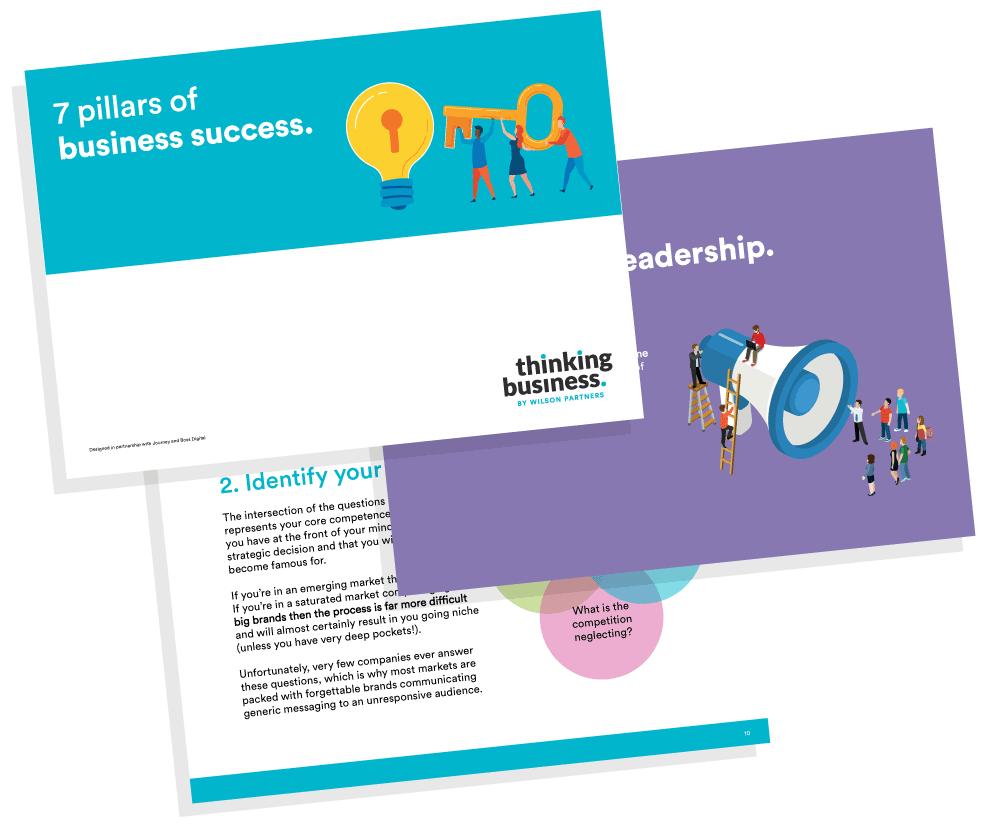
Selling my business: Getting your business fit for sale
It is never too early to start planning for your exit. Early planning and seeking the advice of specialists can improve the efficiency of the sale process, make your business as attractive a proposition as possible and, ultimately, lead to a higher price. It will also mean you are prepared and can take advantage of any ‘off-market’ opportunistic approaches that may materialise.
Wilson Partners pre-sale tips
Management team
A reliable and strong management team that can support the business without the need for you to be involved on a daily basis will make your business more attractive and it also affords you greater flexibility in the sales process. A robust management team will add value and also provide you with the option of selling the business to them. Make sure key management have been identified and incentivised, HMRC approved schemes such as the Enterprise Management Incentive scheme can be designed as ‘exit’ only and are a great way of incentivising management for the long term as well as allowing them to participate in the value realised from the sale process.
Not only it is important to ‘lock-in’ key management with incentives, but make sure employment contracts are in place and are well-drafted. Buyers will want the comfort of knowing that key members of staff are on acceptable terms as to the notice they have to give; that there are enforceable restrictive covenants against non-solicitation of customers and staff; and around the ownership of developed IP.
Financial information
First impressions count and poor-quality financial information may at best prolong any pre-acquisition investigation (due diligence) a purchaser undertakes but could result in a challenge to the pre-agreed sale price, or even the withdrawal of the buyer from the acquisition process. Good quality, up to date financials not only make good sense but make a buyer’s ability to value your business, and rely on the financial results, much easier.
Some vendors choose to undertake vendor due diligence to maintain control of and ensure an efficient sales process, guarantee quality information is provided to the purchaser in a timely fashion. Financial, commercial and operational areas of risk and opportunity are identified, thus enabling the seller to address any issues that may affect valuation in advance, as well as creating the right expectations with the buyer.
Profitable growth and sustainable performance
Often business owners will do what they can within the business to minimise profits in order to reduce their tax bill. However, this does not work in their favour when it comes to a sale, as the majority of transactions are completed as a multiple of sustainable profit and the more profitable it is, the more valuable it is to a buyer.
Buyers want to see a history of profitable growth, not just one year’s worth and, if you suddenly decide to sell your business today, you don’t have the option of going back in time, declaring more profit and paying the tax. You will just be stuck with a lower value business.
In a similar vein, remove discretionary and excessive proprietary expenses. Whilst your advisors will do this when presenting the businesses results to prospective bidders, it is a much easier sell if they have already been eliminated!
Knowing the right time to sell is imperative. Understanding your business’s profit trends and future growth opportunities, as well as underlying market dynamics, can dictate the optimal time to sell a business. Identify sustainable sales and margin growth opportunities as well as cost savings to maximise value.
Being able to present your business’s future growth opportunities and potential future profits to buyers will also enhance its value.
During a sale process, it is also key to perform well compared to forecasts. A strong financial performance during diligence and negotiations will provide additional confidence to the prospective buyer and ensure the pre-agreed sale price is maintained.
Maximise asset values
Greater overall value may be achieved through separating certain assets (e.g. freehold property, where a buyer may only want to take a lease or part of the site) from the business pre-sale. Similarly, make sure assets that are key to the business are owned by the business if possible. Typically, this relates to intangible assets such as intellectual property rights, website and domain names etc that are often held personally. The tax implications of both removing and including assets need to be considered.
Manage current and future risks
Managing the risk profile of the business on the run up to a sale is critical to increase value and make your business sale ready.
Customer and supplier dependencies, key employee dependencies, technological disruption, changes to the competitive environment in your markets, and threatened changes to regulatory or legal frameworks can all impact the overall assessment of risk, and can derail a deal.
In some cases, customer or supplier concentration cannot be avoided but where possible this can be mitigated by incorporating or extending customer or supplier contracts to enhance the strength of these relationships.
Manage cash, debt and working capital
Buyers will seek to acquire a business with a ‘normal’ level of working capital being retained. Understanding your business’ working capital cycle and being able to drive efficiencies in its working capital management can unlock additional value in a sale process.
Typically, cash will be added to the headline value, with debt and debt-like items such as corporation tax liabilities being deducted from the price.
Less stress!
First time sellers frequently underestimate the amount of work required to keep a business running smoothly whilst going through a sale process. Undertaking legal and financial housekeeping early removes some of the burden and presents your business governance in the best possible light.
Review the company’s file at Companies House, make sure it is up-to-date, such as filing the necessary paperwork to remove registered charges that have been satisfied, statutory accounts have been filed etc. A good accounting firm should be able to provide this service for you.
From a legal perspective, make sure that items such as incorporation documents, share certificates, property leases, title deeds, intellectual property rights, employee contracts or customer and supplier agreements are in place and up to date. Key contracts such as facility agreements, CBILs loan arrangements, long term supply arrangements or accreditation arrangements etc. often contain change of control provisions entitling the other party to terminate in the event of a sale. Similarly, businesses which are regulated by the FCA such as insurance brokers or any business with a consumer credit licence; or businesses regulated by CQC or NHSE may have a licence with a change of ownership clause. Identifying these early and having a strategy for obtaining consents to a timetable that makes sense of deal confidentiality and a completion deadline will be important.
Tax planning
The sale of a business in the UK will generally be subject to Capital Gains Tax.
It’s also important to think about the tax-efficiency of your business and personal wealth both before and after the sale to ensure that your assets are structured tax efficiently to create the best possible outcome for you. Whilst we still have business asset disposal relief, its limit to £1m lifetime allowance means it’s ever more important to ensure that you get full use of it, and so ensuring that spouse or other family co-ownership is put in place in time and in accordance with the qualifying conditions to ensure any additional relief can be obtained.
Early tax planning is essential as failure to do so could significantly affect the net value you ultimately receive on the sale.
Appoint the right team
The sale process is often the culmination of years of hard work so make sure you appoint the right team to give you and your business the best possible outcome.
Make sure that your lawyers, corporate finance team, accountants and other professional advisers have an in-depth understanding of your long term strategic and commercial goals and a good track record in the type of deal you’re embarking upon which will help avoid the pitfalls that can impact on its success.
Bad advice can be expensive whereas good advice can make all the difference and make all those sacrifices worthwhile. Whatever you do, don’t do it on the cheap. Take up references and ask to speak to clients who have also sold out in recent years so that you can gauge their experience of the sale process and the advice they received.
Experienced advisors will provide valuable advice to make your business ‘sale ready’, understand and maximise its value and support you in executing a successful transaction. The further in advance you can begin these conversations and consider these questions, the better the chance of a successful transaction.
At Wilson Partners, as well as providing day to day accounting and business advisory services, we also have an in house business valuations team and a Corporate Finance team giving us the ability to advise clients through the full exit journey ensuring a smooth process and realising as much value as possible. For more information, why not get in touch for an informal chat.
Event
Webinar – Changes to the UK Trust Registration Service, May ’22
A short webinar and Q&A session with our Trust specialists Jodie Green and Sara Pedrotti. You can view the video and download the presentation here.

Download our free guide to the 7 pillars of business success
Read our free guide what you need to focus on to help you make better decisions and achieve your goals quicker.
Please complete our form to download the guide.
Sign up to receive alerts
Call us on 01628 770 770 for a no-obligation chat
You may also be interested in...
Meet the team in 90 seconds – Lesley Kibble
Introduce yourself Hi, I'm Lesley, outside of work I love to travel with my partner Lee and visit new places. I recently returned from Krakow, Poland…
Seeking investment: Getting your business fit for investment
Get your house in order before seeking finance, and you may not need it! Before looking for capital from external sources, it is paramount to ensure…
Meet the team in 90 seconds – Tom Bradbury
Introduce yourself Hi, I'm Tom and I am a Director in the Corporate Finance Team here at Wilson Partners. I started my career and did my training…




